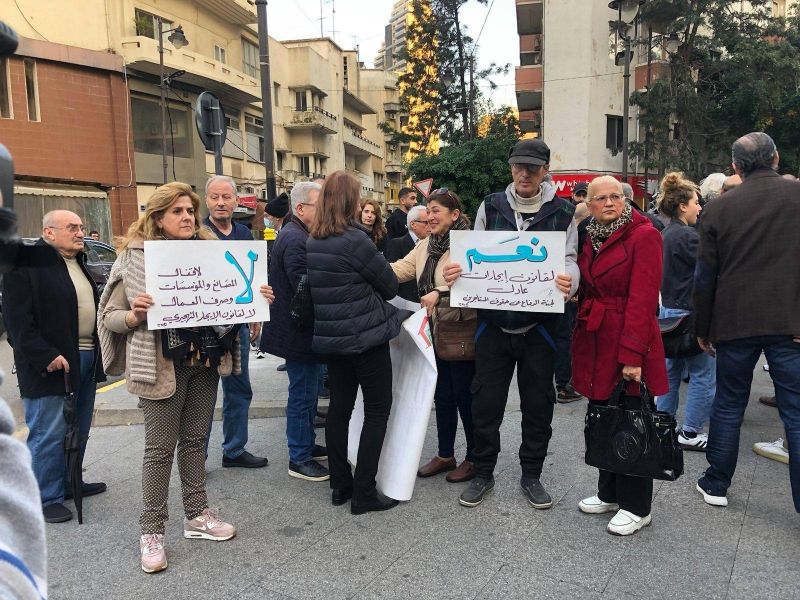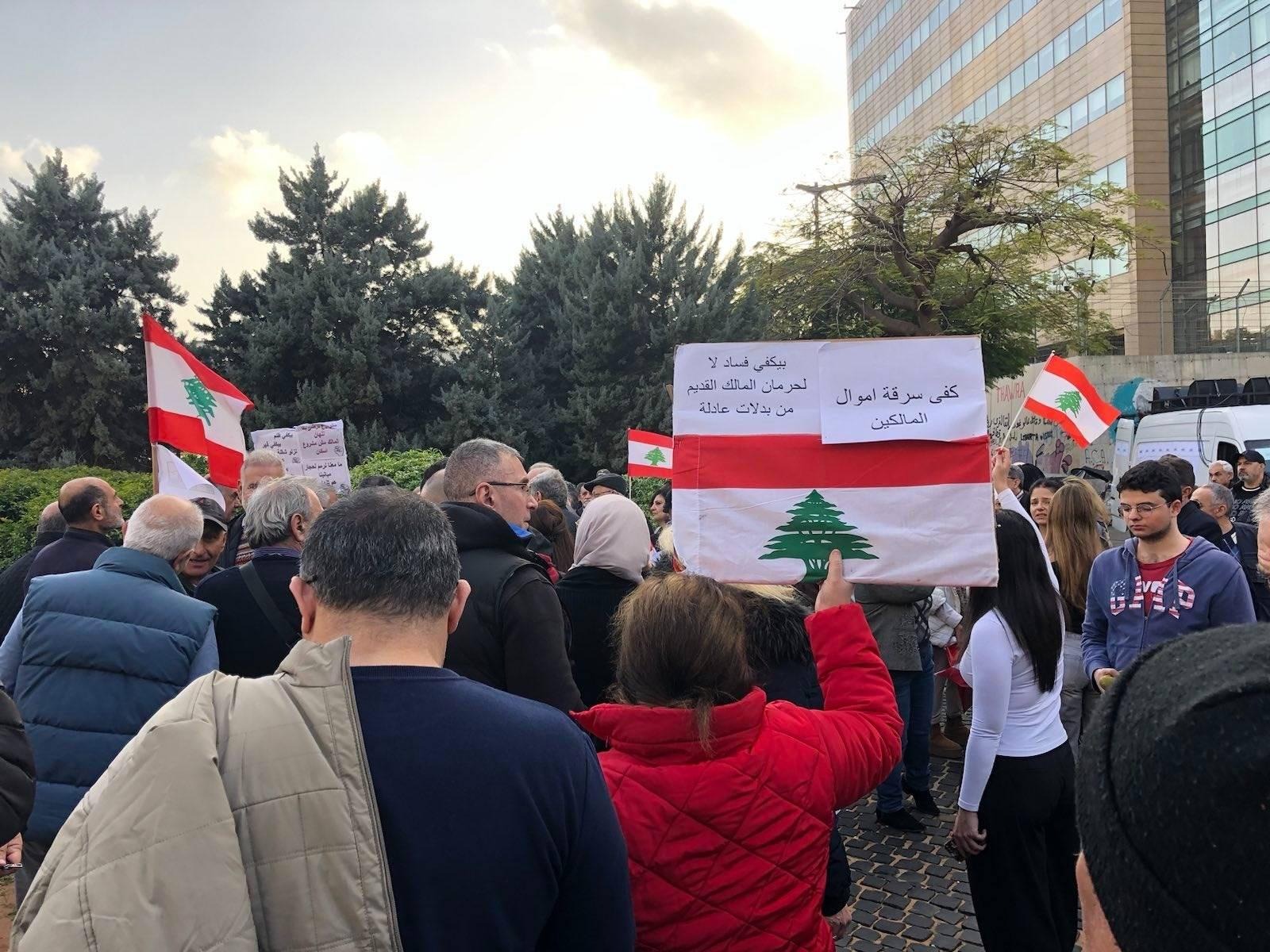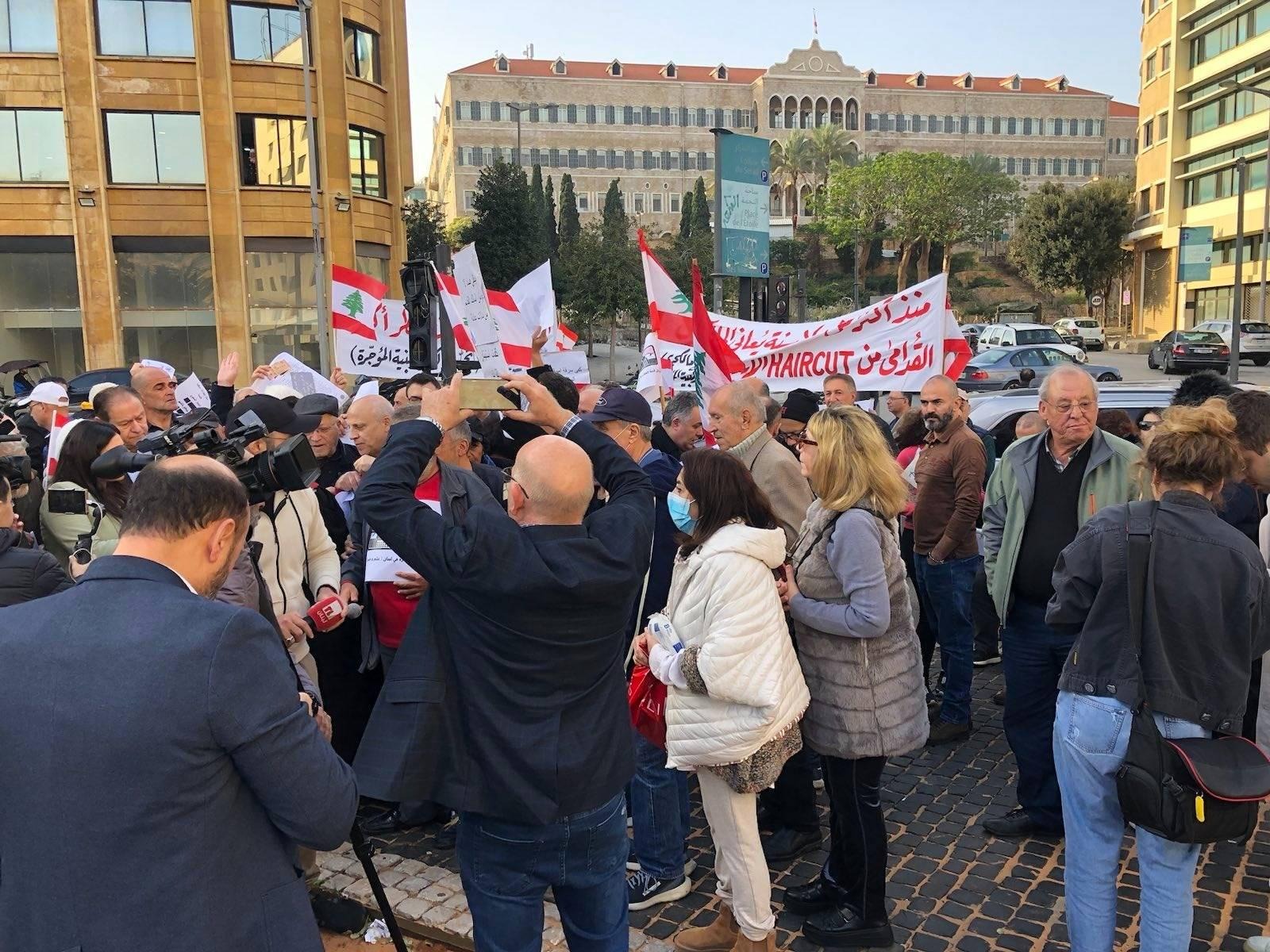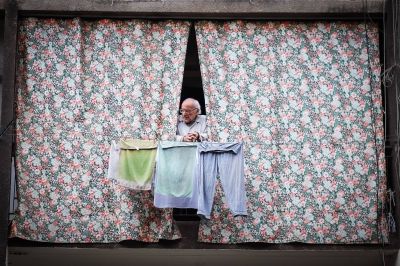
A small crowd, rallied by the Committee for Defending Tenants' Rights in Lebanon, gathered in Achrafieh’s Sassine square to demand just the new non-residential law to be halted, Jan. 9, 2024. (Credit: Sally Abou AlJoud/L'Orient Today)
BEIRUT — Protesters in disagreement over a new rent law held two separate sit-ins Tuesday in Beirut, reflecting fears that the law could hurt small business tenants if implemented while stifling much-needed income for property owners if not put in action.
Passed by Parliament in December though not yet minted in the Official Gazette, the law would see a dramatic increase in the rent tenants must pay for non-residential properties — the first such hike since the country’s decades-old 1963 rent law.
It is unclear whether the cabinet will move forward with publishing the law soon or send it back to Parliament for amendments.
Nevertheless, the law is already sparking controversy.
One main point of contention: how the new law will set rental fees. Non-residential properties will be appraised based on their location and other factors — which in itself is not new. But now, eight percent of that appraisal value will become the annual rental fee owed by tenants.
Of this eight percent, 25 percent will be paid by the tenant during the first year after the new law becomes effective. Fifty percent of it is paid for the second year and 100 percent for the third and fourth years.
 The Gathering of Owners of Rented Buildings in Lebanon organized a protest Tuesday in Riad Solh Square, in downtown Beirut, calling against a potential suspension of the new non-residential rent law, Jan. 9, 2024. (Credit: Sally Abou AlJoud/L'Orient Today)
The Gathering of Owners of Rented Buildings in Lebanon organized a protest Tuesday in Riad Solh Square, in downtown Beirut, calling against a potential suspension of the new non-residential rent law, Jan. 9, 2024. (Credit: Sally Abou AlJoud/L'Orient Today)
To put this into perspective, if the value of a property is estimated at $100,000, the rent fee per year according to the new law becomes $8,000 per year.
For the first year, the tenant pays $2,000. For the second year, the tenant pays $4,000. For the third and fourth years, the tenant pays $8,000.
It’s a dramatic increase for tenants who, until now, have been paying pennies on the dollar since Lebanon’s economic crisis tanked the lira starting in 2019.
However, owners claim that some tenants — including those owning profitable businesses such as gold shops and health clinics — would be able to pay the new fee.
‘Pay me what I deserve’
The Gathering of Owners of Rented Buildings in Lebanon rallied around 50 property owners Tuesday in Riad Solh Square, in downtown Beirut, calling against a potential suspension of the law.
They said the new law would be fairer to them, bringing to an end decades of low rental payments.
“50 years occupying for free!” one protester shouted through a megaphone.
“We call on cabinet to publish the law in the Official Gazette immediately,” Andira Zuhairi, head of the group organizing the protest, told the crowd. “It is time for the old owners to be granted their rights.”
Mahmoud Kleilat, one protester, said he owns a building of two apartments and a commercial shop in Verdun which he described as “huge.”
 The Gathering of Owners of Rented Buildings in Lebanon organized a protest Tuesday in Riad Solh Square, in downtown Beirut, calling against a potential suspension of the new non-residential rent law, Jan. 9, 2024. (Credit: Sally Abou AlJoud/L'Orient Today)
The Gathering of Owners of Rented Buildings in Lebanon organized a protest Tuesday in Riad Solh Square, in downtown Beirut, calling against a potential suspension of the new non-residential rent law, Jan. 9, 2024. (Credit: Sally Abou AlJoud/L'Orient Today)
“For that, the tenant pays me only LL5 million a year,” he told L’Orient Today, equal to about $55 at today’s market exchange rate.
“For my apartments, each around 250 square meters, [the tenants] send me LL1.3 million per year, through the notary office.”
“I am demanding that they pay me what I deserve,” Kleilat said. “I don’t want to kick anyone outside, that’s not my intention, I just want to be paid a fair rent.”
‘We are with rent increases but not eight percent’
About an hour later, a small crowd, rallied by the Committee for Defending Tenants' Rights in Lebanon, gathered in Achrafieh’s Sassine square to the sound of blaring music to demand just the opposite: that the law be halted.
Among the crowd was Bassam Mkhaiber, who has rented a shop in Beirut since 1958.
“At the time, the owner used to demand a vacancy fee upon renting a place,” Mkhaiber said. The vacancy fee was a fee that amounted to 15 to 20 percent of the property value and was paid upfront by the tenants. The tenant would then pay a yearly rent.
Mkhaiber said he paid LL275,000 as a vacancy fee in 1958. This used to be equivalent to around $87,000 at that time’s LL3.16-to-the-dollar exchange rate.
 A small crowd, rallied by the Committee for Defending Tenants' Rights in Lebanon, gathered in Achrafieh’s Sassine square to demand just the new non-residential law to be halted, Jan. 9, 2024. (Credit: Sally Abou AlJoud/L'Orient Today)
A small crowd, rallied by the Committee for Defending Tenants' Rights in Lebanon, gathered in Achrafieh’s Sassine square to demand just the new non-residential law to be halted, Jan. 9, 2024. (Credit: Sally Abou AlJoud/L'Orient Today)
“Let [the owner] give me back the vacancy fee I had paid and I’ll vacate,” he said. “Because two years to vacate [the property] with no money will be a humiliation.”
Now, the new rent law gives commercial property owners the option to take back their properties altogether in two years in lieu of collecting higher rent.
“This law is exclusively giving the owner the right to terminate a business that has been there for over 40 years,” Mkhaiber said.
Mkhaiber said he currently pays LL5 million in annual rent, around $55.
“We are with rent increases but not eight percent,” he added. “We want to find a solution that would work for us and the owner.”
What about residential rent hikes?
Salwa Habla, also in Sassine, said she fears the new rental law for non-residential buildings could reopen proceedings to amend a similarly controversial law for residential properties, which was passed and published in the Official Gazette in 2014.
Habla has been renting a two-bedroom apartment of two bedrooms in Beirut’s Tariq al-Jadideh neighborhood since 1978.
Her LL800,000 in annual rent was once worth more than $500. Now, due to the devaluation of the Lebanese lira since 2019, she’s paying the equivalent of just $9 per year.
“We are with the rent increments, we want the owners to get their rights,” Habla said. But a dramatically higher rent would be hard on her family.
“My husband and I are elderly and each one of our children now has children of their own and barely making ends meet,” she added.
“They can only help us with food.”
